In my March 10 blog, “Covid-19 takes toll on mariachi community,” I spoke about the scarcity of mariachi work during the pandemic, ending on the optimistic note that “the light at the end of the tunnel is already visible.”
Well, a lot has changed over the last two months. Not only has mariachi work returned, but it has returned in record proportions. Virtually every mariachi musician and group leader I’ve spoken to coincides that there was more work this past May than any of us had previously seen in our lifetimes, and some of us have been playing this music for 40 years or more. I personally worked more than 30 hours over Mother’s Day weekend with Mariachi Viajero of San José, California.
Never in my life have I seen this much work before.
Álvaro Paulino, Jr.
Felipe García, leader of San José, California’s Mariachi Tapatío, says his group worked about 35 hours during Mother’s Day week. “It’s the law of supply and demand,” Felipe explains. “At least for the moment, there’s a high demand for mariachi music, while at the same time there’s a scarcity of groups and musicians.”
Rubén Moreno, leader of Tucson’s Mariachi Sol y Luna, reports: “Just in the last month, we’ve played more hours than during the last 18 months combined. It’s been a tsunami of mexicanos tired of being couped up. I see this superabundance of work as a direct response to the quarantine of the last year and a half.”
“Thank God, since April we’ve been working nonstop, even mid-week,” says Javier Magallón, leader of Oakland, California-based Mariachi Colima. “Our group just celebrated its 30th anniversary, and this has been a record season for us,” asserts Javier.
The island of Puerto Rico was hit particularly hard by Covid-19, as José Ramón “Monchín” Montelongo of Mariachi Jalisco de Puerto Rico describes:
Due to the pandemic, we got laid off from our restaurant planta. The government imposed a curfew that lasted for an entire year, so there was no night life during that period. I thought my group was going to have to disband and I was making plans to immigrate in search of work when, starting earlier this year, things began picking up to a degree I never could have imagined. Two days before Mother’s Day, we started working almost around the clock, so great is the demand for live mariachi music here right now.
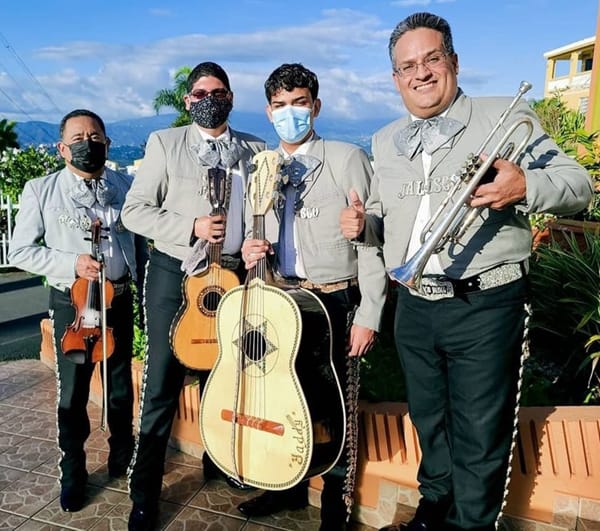
Arturo Torres, Josué Islas, Julián Montelongo, José R. Montelongo
Alvaro Paulino of New York City’s Mariachi Tapatío tells a similar story:
Never in my life have I seen this much work before. For the last two months, my group’s been playing every single day of the week. Each weekend we work at least 25 hours. Customers are calling me continuously and our calendar is completely full. I know this situation can’t last forever and that things will eventually go back to normal, but I hope this windfall lasts at least through the summer.
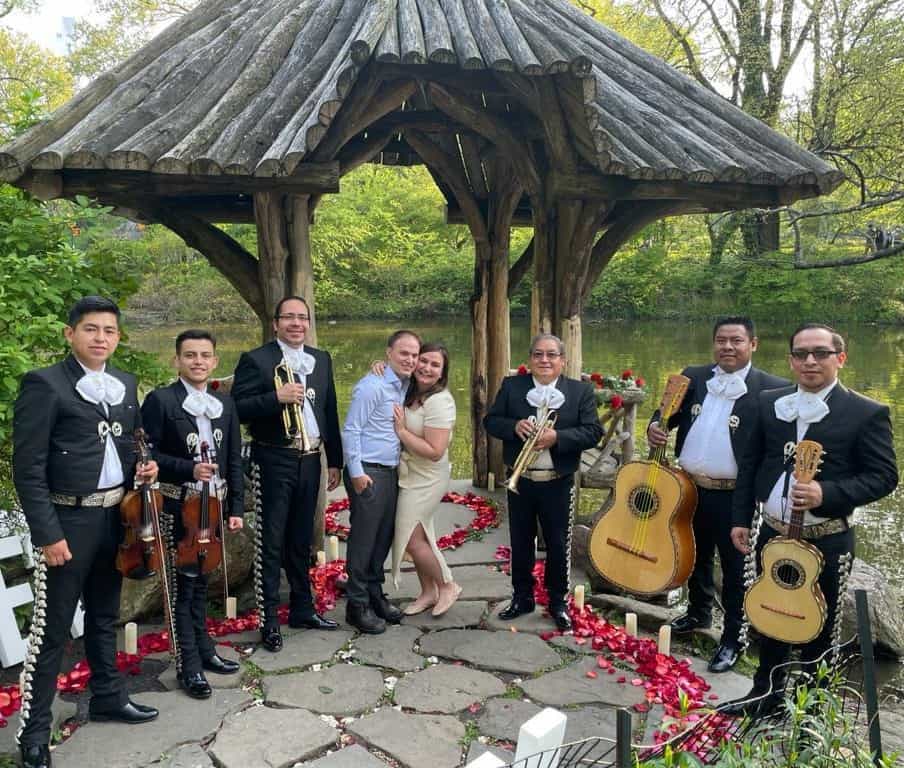
L to R: Cristian Páez, Daniel Gómez, Álvaro Paulino Jr., Álvaro Paulino Sr., Armando Sánchez, Juan Bravo
Francisco “El Chino” Rodríguez of Denver, Colorado, who plays with Juventino Romero’s Mariachi Sol de mi Tierra, comments:
When the pandemic broke out, things ground to a standstill. To be sure, there was still work out there, but most of us didn’t take it, only those musicians who had such a great financial need that they were willing to risk infection. Personally, I went for five months without hardly leaving the house.
Losing our planta turned out to be a blessing in disguise. Before, there was always lots of work we couldn’t accept because we were committed to playing in the restaurant during peak-demand hours. Now, we grab every chamba that comes along. Our group has always worked a lot, but now we’re working more than ever.
Carmen Núñez is a dual language immersion teacher for the Pasadena Unified School District who also plays with Mariachi Canciones de mi Tierra, as does her husband and their two children. Carmen gives the following explanation for the current shortage of mariachi musicians in the Los Angeles area:
During January and February of this year, not a day went by that we didn’t hear about another compañero who had died of Covid; sometimes two on the same day. Besides this, many left for Mexico when the pandemic hit, and they haven’t returned. I’ve often stopped by the Boyle Street plaza on weekends looking for musicians, and not a single one is available.
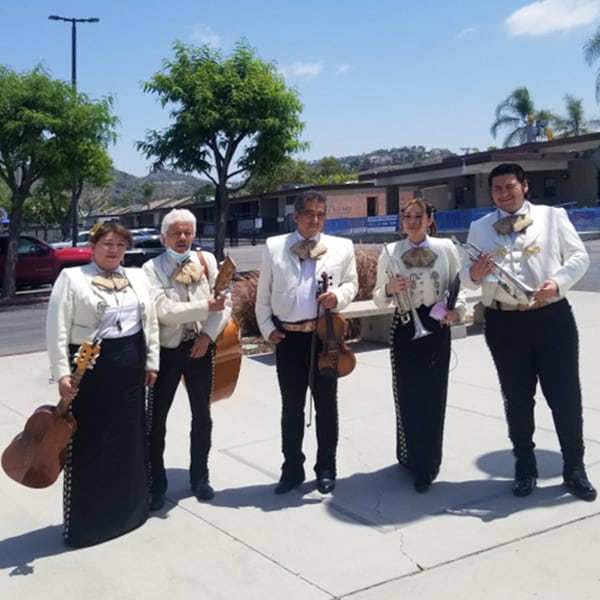
L to R: Carmen Núñez, Rigoberto Jiménez, Gabriel Robledo, Melody Núñez, Adrián Núñez
Alejandro “Alex” Cisneros is a regular fixture at LA’s Boyle Street mariachi plaza, where his family has worked for over 30 years, and where and his brother Juan sit on the board of directors of the newly-reorganized OMICAL (Organización de Mariachis Independientes de California). Alex comments:
Lately, there’s been more mariachi work than I’ve ever seen in my lifetime, and every group is incomplete right now. There are no guitarróns, no trumpets, no violins… These days, customers who come to the plaza on weekends or holidays are likely to find the square empty, without one mariachi in sight.
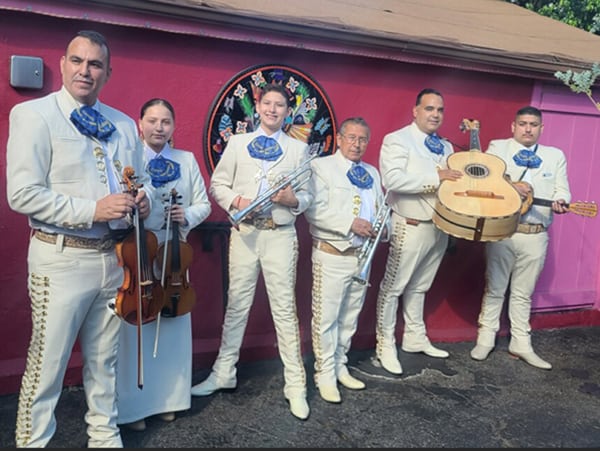
Alejandro Cisneros, Fernanda Cisneros, Alejandro Cisneros Jr., Jorge “El Ratón Vaquero” Pérez, Ron Rodríguez, Alejandro Verduzco
Unfortunately, the same isn’t quite true south of the border, due at least in part to the fact that Mexico is months behind the U.S. in its vaccination effort. But according to Juan Mercado, owner of a small musical accessories shop in Mexico City’s Plaza Garibaldi, mariachi work there is back to about 80–90% of pre-pandemic levels. “Don’t forget that a year ago work was down to almost zero, and the only way many mariachis survived the crisis was through food donations,” he reminds us.
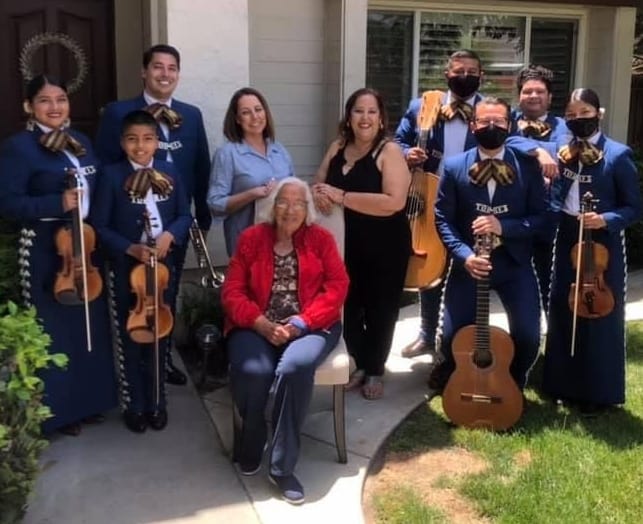
Karina Torres, Cristian Torres, Eduardo Ruiz, Mario Torres, Benjamín Mora, Carlos Hidalgo, Melanie Torres.
The phone was ringing off the hook with calls for Mother’s Day weekend, but this year we decided to do something a little different. Our whole mariachi was commenting that none of us had ever taken a serenade to our own mothers, and that some of our moms had never received a serenade in their whole life, so we decided to devote this Mother’s Day exclusively to playing for our own families, and I didn’t book any gigs for that Sunday.
We started out by serenading my wife’s mother, and from there we went to my grandmother’s house, and from there to my mother’s house. After that, we went to play for the girlfriend of our guitar player, Benjamín. She wasn’t home, so we serenaded her mother. “Benji sure scored some points with his suegra!” we overheard one of the family members say. Next, we serenaded the sister of our vihuela player, Carlos. From there, our trumpet player, Eduardo, took us to his house, where we played for his mother and grandmother.
Next, Benjamín took us to his paternal grandmother’s home, and from there we went to his own house where we serenaded his mother, maternal grandmother, and aunt. Afterwards, we went to my wife Karina’s aunt’s house. Her aunt wasn’t home, so we played for her uncle, who burst into tears of emotion. After playing for Carlos’s wife, we serenaded my sister. Passing by the home of a former bandmember, we decided to stop in and give his mother a serenata. From there, we went to Carlos’s mother’s house.
By that time, we’d exhausted our list of family members, but we were still in the spirit and not ready to go home, so we took a serenade to Ina, the wife of our former teacher and group leader, Mark Fogelquist. (Many of us had previously been members of Mark’s former group, Mariachi Chula Vista.) After that, we went to the home of Wendy Charines and Serafín Paredes, also dear friends and distinguished mariachi teachers. They weren’t home, so we gave them a virtual serenata via Facetime. Finally, the group formed a circle around my wife Karina, who plays violin with our group, and gave her the last serenata of the day.
By then it was about 5 p.m., and we all went home to spend the rest of the evening with our own mothers and family. It had been a day that none of us will ever forget as long as we live. Even though we took Mother’s Day off this year, our group, Mariachi Torres, still worked over 15 hours that weekend!
—Jonathan Clark

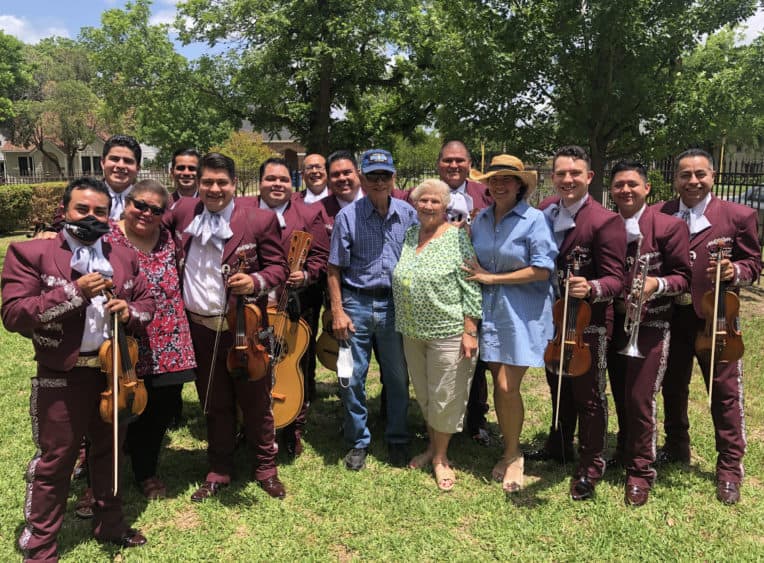





Es importante estar atentos a los acontecimientos referentes al mariachi. Es muy diferente en las distintas partes del mundo, pero por este medio podemos saber de qué manera ayudar, aportar y no dejar que muera nuestra música más bella del mundo: el mariachi. Gracias, Jonathan Clark, por tantos años de investigación sobre este género y la gran labor y aportación que nos has enseñado y dejado a las futuras generaciones.
Thank you for taking the time to write down great memories that will be cherished forever.
Gracias a Dios, últimamente hemos tenido bastante trabajo. El año pasado todo el trabajo y contratos que teníamos se cancelaron debido a la pandemia. Y ahora que regresamos disque a la normalidad, volvemos a la labor mariachera, tratando de cumplir con esos contratos, más las nuevas celebraciones y presentaciones actuales. Qué gusto me da de que la situación se ve mejor. Incluso el futuro de los músicos se ve positivo.
Gracias, Jonathan Clark, por el artículo.
Great article, Jon. I love it how you interviewed mariachis that we don’t usually hear from. Keep up the good work.
¡Un artículo muy interesante! Me encanta que incluye las voces de mariachis que normalmente no se escuchan. ¡Adelante!